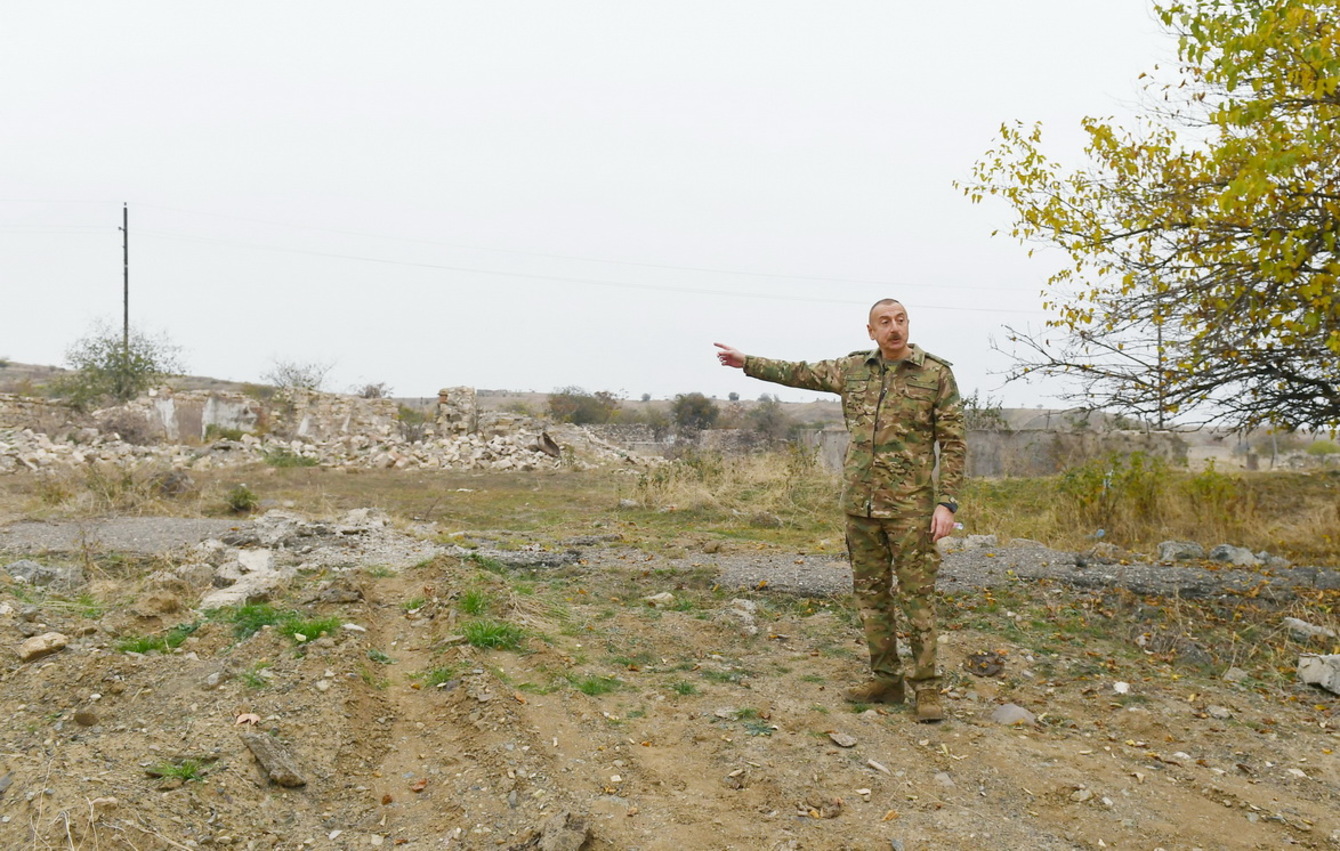Azerbaijan's President Ilham Aliyev revealed the country's plans for constructing a new airport in the recently liberated Fuzuli district. The president said the new airfield will help leverage the potential of Shusha, a major city in the country's Nagorno-Karabakh region, as a cultural and tourism destination.
"I have ordered that an international airport be established in Fuzuli this year. At least a runway should be put into operation," President Aliyev said, adding that instructions have already been given to identify a suitable location and demine it, according to President.Az.
The airport will be the new route connecting Shusha to surrounding cities and districts, in addition to the Aghdam-Khankendi-Shusha highway and the Lachin corridor in Azerbaijan's Karabakh region. President Aliyev said the construction of the Fuzuli international airport will create new opportunities to attract tourists as it will be possible to arrive there and travel a short distance to Shusha.
Fuzuli locates 60 kilometers southeast of Shusha. Both Fuzuli and Shusha remained under Armenia's occupation for nearly three decades since the early 1990s when Armenia and Azerbaijan fought a lengthy war in the latter's Karabakh region. Following the Soviet Union’s dissolution in 1991, Armenia kicked off a full-blown military aggression against Azerbaijan. The bloody war until a ceasefire in 1994 saw Armenia occupying 20 percent of Azerbaijan’s internationally recognized territories – the Nagorno-Karabakh (Daghlig Garabagh) region, including the city of Shusha on May 8 in 1992, and seven surrounding districts, including Fuzuli on August 23 in 1993. Over 30,000 ethnic Azerbaijanis were killed and one million were expelled from those lands in a brutal ethnic cleansing policy conducted by Armenia.
During its occupation, Fuzuli saw the annihilation of almost the entire district by Armenia's forces. After the liberation of Fuzuli on October 17 last year, the Azerbaijani authorities said the area resembled a real "ghost town" with the whole infrastructure of the city being razed to the ground. President Aliyev has then said the Azerbaijani soldiers could not find a single building to raise a flag.
The latest outbreak of war in the region started on September 27 after Armenia's forces deployed in the occupied Azerbaijani lands shelled military positions and civilian settlements of Azerbaijan. The attacks triggered the Azerbaijani forces to take immediate counter-offensive measures for pushing back the assault. Intensive relocation of personnel and military equipment to the battlefield by both sides fanned the flames of the largest clashes between Armenia and Azerbaijan since the 1994 ceasefire.
The war ended in a tripartite ceasefire statement signed by Armenia, Azerbaijan and Russia on November 9. By then, Azerbaijani forces liberated more than 300 settlements, including the cities of Jabrayil, Fuzuli, Zangilan, Gubadli and Shusha. The liberation of Shusha on November 8 marked the end of Armenia's resistance and agreeing to a ceasefire. The statement reaffirmed Azerbaijan's territorial regains, and obliged Armenia to return the Aghdam, Kalbajar, and Lachin districts to Azerbaijan by December 1.
Since the ceasefire, government of Azerbaijan has launched state programs for the restoration of the liberated lands, including laying a road to the Talish and Sugovushan villages of the Tartar district, and the construction of the Fuzuli-Shusha highway. President Aliyev declared Shusha the capital of Azerbaijani culture. The Azerbaijan State Tourism Agency developed a plan to transform the region into a new tourist destination.
The airport in Fuzuli will be the second of its kind after the Khojaly Airport in Azerbaijan's Karabakh region. The Khojaly Airport is out of operation for almost 30 years following Armenia's occupation of Azerbaijani lands.
The Azerbaijani government has simultaneously launched legal procedures to calculate the damages inflicted by Armenia on the country's cultural heritage, social infrastructure, and natural resources during the years of occupation. Officials in Baku vowed to sue the government of Armenia for the acts of vandalism committed in the once occupied Azerbaijani lands. According to initial calculations, the cost of damage caused by Armenia is estimated to be tens of billions of dollars.







 Armenian sappers commenced on Monday mine-clearance operations in the territories adjacent to the Saint Mary Church in village of Voskepar (Armenia...
Armenian sappers commenced on Monday mine-clearance operations in the territories adjacent to the Saint Mary Church in village of Voskepar (Armenia...
 Iran and Pakistan have signed eight cooperation documents in various fields, and agreed to strengthen ties to fight terrorism in the region.
Iran and Pakistan have signed eight cooperation documents in various fields, and agreed to strengthen ties to fight terrorism in the region.
 President Aliyev emphasized the critical role of the North-South Transport Corridor in fostering transport cooperation between Azerbaijan and Russi...
President Aliyev emphasized the critical role of the North-South Transport Corridor in fostering transport cooperation between Azerbaijan and Russi...



